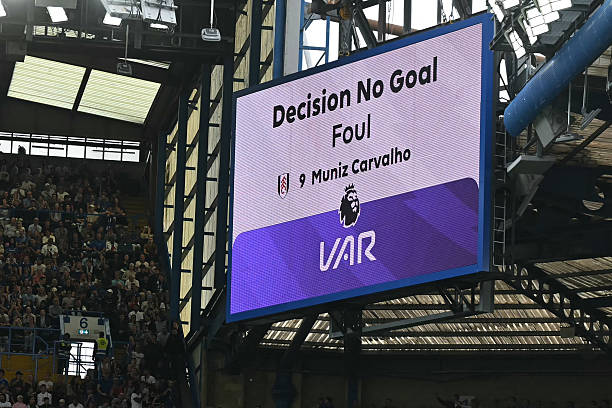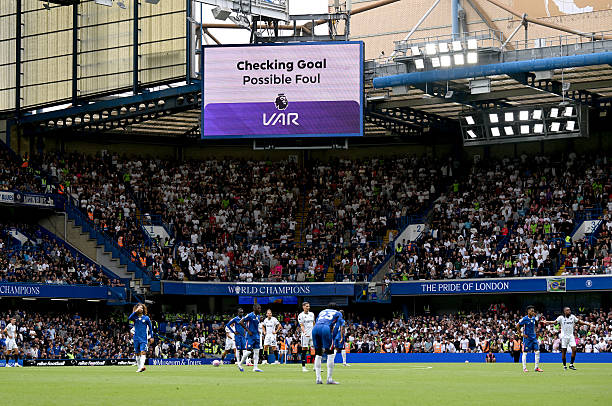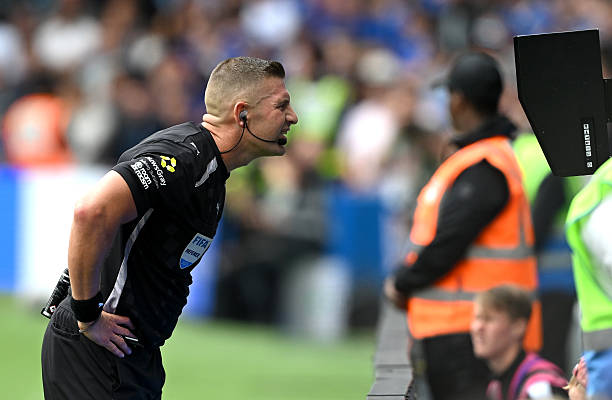PGMOL chief Howard Webb has publicly admitted that VAR made a “wrong” call to disallow Josh King’s goal in Fulham’s 2-0 defeat at Chelsea on Saturday.
Webb criticised the decision saying “guidance wasn’t followed properly” by the VAR team, stating the soft foul call on Rodrigo Muniz was a clear error that “had a significant impact.”
The blunder prompted VAR Michael Salisbury’s removal from his weekend appointment, as Fulham boss Marco Silva branded the intervention “unbelievable.”
The refereeing boss also defended the call to rule out Eberechi Eze’s free-kick goal for Crystal Palace, explaining that Marc Guéhi breached the one-metre wall rule and “physically moved” Moisés Caicedo to create the gap for the strike.
Fulham’s First-Half Goal Sparks Controversy
18-year-old Josh King thought he had scored his first-ever Premier League goal in the 21st minute at Stamford Bridge to put Fulham ahead.
However, VAR Michael Salisbury advised referee Rob Jones to review the incident at the pitchside monitor, leading to a foul being awarded against Rodrigo Muniz for his challenge on Trevoh Chalobah.
The decision drew immediate criticism, with Fulham boss Marco Silva branding the intervention “unbelievable.”
PGMOL responded swiftly, removing Salisbury from his assigned VAR duties for Sunday’s Liverpool vs. Arsenal clash and admitting a mistake had been made.

“It Wasn’t Controversial, It Was Wrong” – PGMOL
Speaking on the Premier League’s official VAR programme, Webb did not hold back in his assessment of the incident.
“It wasn’t controversial, it was wrong,” Webb said.
“We’ve established some principles in terms of how we officiate in the Premier League and how we use VAR.”
“They sit around a high threshold for penalising contact it aids the flow and rhythm and tempo of the game.
“We’ve also established a high bar for intervention with VAR. In other words, if situations are not clearly wrong and the referee has made a call on the field, that call will stand, or at least should stand.”
“And that’s the message that we give to all of our VARs, particularly when we come to taking away goals that are so obviously such a crucial moment in the game.
“We should only be taking goals away when the evidence is very clear that that’s the only thing we can do and that’s the guidance we give to our officials.
Webb said officials became “super focused on contact” and failed to assess the full context of the play.
“In this situation, that guidance wasn’t followed properly. There was a misjudgement by the officials involved in this situation about how that contact happened between Muniz and Chalobah.”
“The officials got super focused on that contact without looking at the full context of how it happened.
“It happens when Muniz is in possession of the ball, controls the ball, turns naturally and brings his foot down on to Chalobah who has moved his foot into a space which the Fulham player has the right to put his foot into in that normal way.”
“So, a misjudgment by the officials.”
Crystal Palace’s Disallowed Goal Explained
Webb also shed light on another high-profile VAR intervention during Chelsea’s recent fixtures, explaining why Eberechi Eze’s stunning free-kick goal for Crystal Palace was chalked off because Marc Guéhi was deemed too close to the Chelsea defensive wall.
“There’s no doubt that Guéhi commits an offence,” Webb said.
“This law changed in 2019. Prior to that, we saw lots and lots of problems at the end of walls with attackers moving into the wall, lots of confrontation.
“So the law was changed to say that all players from the attacking team must stay a metre away from the wall, when a wall is formed.
“To form a wall, it’s three defenders or more. We saw in this situation, I think four defenders in the end from Chelsea to create that wall.
“Now, what Guéhi does, he initially stands away from that formed wall but then he moves, he physically manhandles [Moisés] Caicedo out of the way, and creates a gap and through that gap, the ball goes from Eze’s shot and the goal is allowed to happen because of the action by Guéhi.
“But when he does that, in order to do that, he moves within that one metre of the wall. So, yes he’s within a metre of the wall but really importantly to us, by doing that, he has a big impact. He has an impact on the defenders, he has an impact on what happens.
“To allow the goal to happen, he has to commit this offence and that’s why the officials felt they were duty bound here to intervene and penalize him for being within that metre because of the impact of his actions, not just the fact that he’s less than a metre away.
“You see him here clearly moving Caicedo out of the way, creates an important gap for the ball to go through but, to do that, he has to commit this offence and movement into the wall.
“So, you might see other situations, free kicks, where players are just under a metre away but they have zero impact, they don’t have any influence on what happens, the ball might go in the other corner.
“Yes, technically that might be an offence in the Laws of the Game but, importantly, for the VAR to get involved, we want to see that clear impact of the action, that physical action that Guéhi did to allow the goal to happen.
“He also committed that offence of being within one metre of the wall so we felt in the end that was the correct outcome, based on the Law, based on the impact that that action had.”
Webb declared that PGMOL will take lessons from this error to improve decision-making going forward, pointing out that VAR involvement has generally been reduced to preserve the flow of matches.




